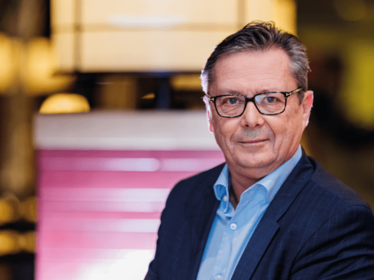Spirit of Columbus
Sitting Down With… Tony van Bijleveld, BU Head of Softgels, Pharma Services Group, Thermo Fisher Scientific, the Netherlands.
You’ve worked in a number of different countries…
I’ve lived and worked in Colombia, Venezuela, Argentina, Brazil, Pakistan, Libya, Chile, Russia, France, and the Netherlands – where I’m based today. I’ve enjoyed experiencing different cultures (some perhaps more than others), but as my wife recently remarked, it’s funny how I’ve never chosen a job because of the geography – the geography always came with the job!

How do you adapt to unfamiliar cultures?
I never expect a new country to adapt to me – that’s probably the most important thing I’ve learned. You can’t pick up Amsterdam or London and then move it to Brazil or Russia, so the important thing is to embrace the cultural differences and learn to enjoy them. I’ve worked in some places that can be pretty dangerous – taking a wrong turn in Sao Paulo could be a serious mistake. So you have to be savvy; bear in mind that as a foreigner you will be associated with wealth and that can make you a target. That being said, as long as you keep a low profile and do what the locals do, you should be fine.
I strongly believe you shouldn’t judge a country until you’ve lived there and properly experienced it. I always say the best captains are the one’s standing on the harbour, watching the ships dock. Many times my perception of a country has completely changed after having understood how the people think and what makes them tick.
Did you always want to work in pharma?
Not as such. After my chemistry degree, I joined AkzoNobel’s management development program. They had a number of different divisions – chemicals, fibers, salt, and pharma – and I transitioned into the pharma side as part of the program. My first taste of the industry was selling a muscle relaxant drug in Colombia. Following that, the company asked if I would head up the sales team in Venezuela. At that time, Carlos Antonio Perez was president and the whole region was booming – it was great time to be in South America. I moved from Venezuela to Argentina after my boss asked me to expand the company’s presence in the country, which I very much enjoyed – kick-starting a trend that would run through my career.
What do you look for when seeking out new opportunities?
If I look back at the jobs I’ve done over the years, they’ve all involved starting from scratch or rebuilding something that’s fallen apart. It just so happens that the opportunities have arisen in a wide variety of countries across the developing world. I also love a challenge, so after a few years in a job I tend to get the itch to try something new – usually after I’ve put in the work to grow the organization and steady the ship. I’ve always been in leadership roles – either sales or general – driving a new organization to do bigger and better things.
What are some of the business challenges in the developing world?
Doing business in parts of the developing world can be very different to doing business in Western Europe and the US. Brazil, for example, thrives on a small number of distributors (local entrepreneurs) who, together with the Ministry of Health in Brazil, determine the landscape for pharmaceutical companies to operate in – and Russia is much the same. In Russia, there’s no reimbursement system so everything is paid out of pocket, unless you’re a war veteran or you have private insurance. The size of these countries (it can take eight hours to fly from Moscow to Vladivostok) also presents some additional challenges in terms of guaranteeing supply to patients, which makes solid distribution networks a must.In Brazil, the inaccessibility of the outer regions in the Amazon or in the swamps of the south present similar challenges. We can sometimes take for granted the vast transport networks that exist in the US and Europe. As a company, you have to accept that the way you conducted business at head office won’t work in these places: there are different stakeholders, people, values and culture – and that means you have to adapt.
Patheon was recently acquired by Thermo Fisher Scientific… How is the transition going?
The transition is going well! I think there are a lot of cultural similarities between the two companies and we both share the same goal of delivering a healthier, cleaner, safer world. And we’re both dedicated to delivering the highest quality medicines to waiting patients. The other thing I see is that the integration is not disrupting the business – and that is essential. Usually what you see with acquisitions is a larger company buying up a smaller one to increase the size of their market share – but this is different because it’s about adjacencies. At Patheon, we covered the entire drug supply value chain from early stage development through to drug manufacturing, except clinical trials packaging and distribution. Thermo Fisher Scientific has that clinical trials division; and, in pooling our capabilities, we’re able to cover the entire supply chain from API through to the patient. It’s a complementary relationship.
What are some of the main trends in the outsourcing sector?
Consolidation is a big trend today. But I also think we’re seeing strong growth in the outsourcing sector in general, with pharmaceutical companies increasingly sticking to their traditional competencies – bringing products to market – and looking to CMOs/CDMOs for innovation in manufacturing and the flexibility that comes with continuous approaches. Clinical trials is another growth area, especially risk-based monitoring. Overall, companies increasingly see organizations like our as partners, as opposed to basic service providers.
Tony van Bijleveld is BU Head of Softgels, Pharma Services Group, Thermo Fisher Scientific, the Netherlands.



















